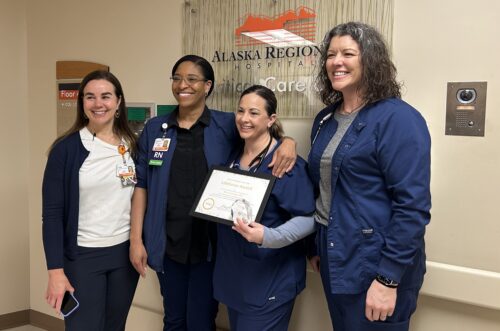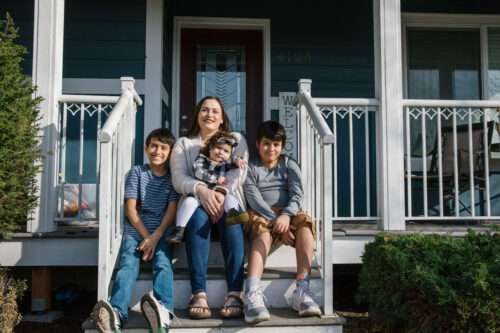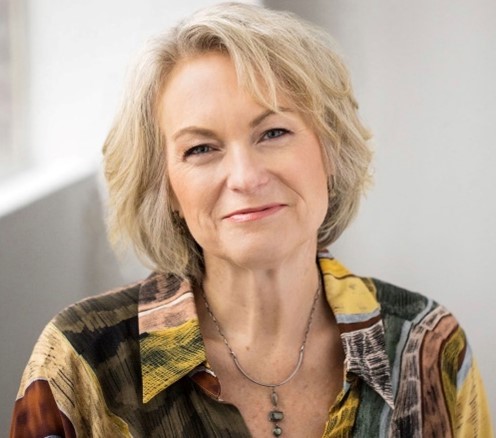In an effort to celebrate the successes and highlight the unique obstacles of our donation partners, we interviewed leaders from around our region to ask why donation is important to them and what they enjoy most about living and working where they do. We are proud to feature Jennifer James, Manager Chaplain Services, Kootenai Health, as this months “Leader in Donation.”
 Kootenai Health provides a wide range of healthcare services to communities in North Idaho, Eastern Washington, Montana, and Inland Northwest. It is a community-owned hospital with its main campus located in Coeur d’Alene, Idaho. Kootenai Health’s comprehensive offerings include heart services, cancer care, a family birthing center, orthopedic services and everything in between. Kootenai Health has already seen 3 organ donors and 19 tissue donors in 2018.
Kootenai Health provides a wide range of healthcare services to communities in North Idaho, Eastern Washington, Montana, and Inland Northwest. It is a community-owned hospital with its main campus located in Coeur d’Alene, Idaho. Kootenai Health’s comprehensive offerings include heart services, cancer care, a family birthing center, orthopedic services and everything in between. Kootenai Health has already seen 3 organ donors and 19 tissue donors in 2018.
What does organ and tissue donation mean to you?
Donation is one way of creating meaning in a tragic situation – and death, no matter how it occurs, is always tragic for loved ones. “Creating meaning,” is not about having answers about why the death occurred; but, rather, a way for something positive to be attached to the loss and grief. Donation honors the deceased, as well as giving life or greater quality of life to the recipient.
Speaking as a chaplain and grief counselor, I know that donation can be a big part of the healing process for a grieving family and have heard from donor families many times how blessed they have been by donation and how much it has helped them cope with the pain of their loss. Understanding that their loved one “lives on” and knowing that lives were saved or improved because of their loved one are incredible gifts to the donor family. Donor families often describe their loved one as someone who was generous and would want to help others and are grateful they were able to help make the gift of donation possible. I have heard donor families speak of recipients as family. A part of someone they loved deeply endures; a life that was cut short continues in a way.
I personally have been a registered donor since I received my first driver’s license. I believe in being a registered donor because to play any part in helping another person live or have a better life is an incredible gift that I want to offer others.
Key point: Offering families the option of donation can help provide hope and healing through the knowledge that their loved one lives on in another person and continues their generous spirit.
What makes you most proud of working at your hospital and why?
I am most proud of the culture of compassion and caring at Kootenai Health. Patients and their families often tell me how grateful they are for the compassion they experience – not just from the health care team, but from everyone involved in their hospital stay. I believe that healing is not about medicine alone, but that caring with heart and presence is critical to healing. Kootenai Health is committed to healing the whole person, and I am proud to be part of the healthcare team.
Why has your donation program been so successful and what drives you to make donation a priority in your hospital?
I think there are three components to the success of the donation program at Kootenai Health: a solid and very involved Donation Council, strong physician and administrative support, and donation champions – especially in the Emergency Department and Critical Care. The Council has worked hard over the years since its inception in 2008 to ensure that we have comprehensive, up-to-date policies in place, and that we are continually providing education (both internally and through LifeCenter Northwest) so that nurses and HUCs (whats HUC?) on critical care and in the emergency department are aware of when to call early for potential donors, and that staff on all units makes timely calls after death.
What drives me to make donation a priority in our hospital is that I have seen the difference donation makes for donor families and recipients – and for staff. Donation helps families and staff find meaning in the loss they have experienced, especially with young and previously healthy patients. Donor families have told me, too, how much memory making during the donation process, as well as the follow-up support provided to donor families by LifeCenter, helps long-term with their grief. I cannot think of a single reason not to make donation a priority.
Best practice: Having a donation council, strong physician engagement and donation champions helps inspire a culture of donation in your hospital, which helps drive a positive donation experience for staff and family in an often dire situation.
What’s unique about healthcare in your region?
Though Kootenai Health is a regional hospital, it is surrounded by a small-town feel. People want to be able to receive their healthcare locally, provided by people they know. Also, there tends to be a strong sense of independence and self-reliance in the people of North Idaho; patients want to be a part of their healthcare decisions and treatment. In order to provide effective healthcare, all of us must to be able to understand and consider these aspects of the culture of North Idaho in our processes.
What do you love about living in your city/region?
I love the natural beauty that surrounds me in North Idaho, and I love the kindness and openness of the people who live here.





